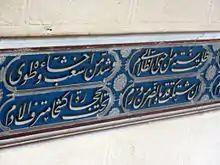Al-Burda
Qasīdat al-Burda (Arabic: قصيدة البردة, "Ode of the Mantle"), or al-Burda for short, is a thirteenth-century ode of praise for the Islamic prophet Muhammad composed by the eminent Sufi mystic Imam al-Busiri of Egypt. The poem whose actual title is al-Kawākib ad-durriyya fī Madḥ Khayr al-Bariyya (الكواكب الدرية في مدح خير البرية, "The Celestial Lights in Praise of the Best of Creation"), is famous mainly in the Sunni Muslim world. It is entirely in praise of Muhammad, who is said to have been praised ceaselessly by the afflicted poet, to the point that the Prophet appeared in a dream and wrapped him in a mantle or cloak; in the morning the poet discovers that God has cured him.[1][2]
| Part of a series on |
| Sunni Islam |
|---|
 |
|
|
| Part of a series on |
| Muhammad |
|---|
 |
|

Bānat Suʿād, a poem composed by Ka'b bin Zuhayr was originally called as Al-Burdah. He recited this poem in front of Muhammad after embracing Islam. Muhammad was so moved that he removed his mantle and wrapped it over him. The original Burdah is not as famous as the one composed by Imam al-Busiri even though Muhammad had physically wrapped his mantle over Ka'b not in a dream like in the case of Imam al-Busiri.
Composition
Al-Busiri narrated the circumstances of his inspiration to write the Burdah:
...I began to contemplate writing a poem in the qasida form, and soon after, I did so as a way of interceding by it with the Messenger of God to God, the Exalted, hoping that he might heal me.
I was repeating it often, singing it, calling upon God through it, and seeking intercession with it. During that time, while sleeping, I saw the Prophet, upon him and his family be prayers and peace. He wiped over my face with his blessed hand and thrust upon me his cloak. I immediately got up and left my house. I had told no one of my poem nor of anything I had been doing prior to that. On the road, I met a fellow spiritual wayfarer, who said to me, "I want you to give me a copy of the poem you wrote in praise of the Prophet, upon him be prayers and peace." I responded, "which one?" He said, "The one you wrote during your illness." He then recited its opening lines saying, "By God, I heard it in a vision last night recited in the presence of God's messenger, upon him and his family blessing and peace. It greatly pleased the prophet, and I saw him thrust his cloak on the one who wrote it!"
I provided him with a copy, and he began telling others of his vision. Thus its news spread far and wide.
— Imam al-Busiri
The Burda is divided into 10 chapters and 160 verses all rhyming with each other. Interspersing the verses is the refrain, "My Patron, confer blessings and peace continuously and eternally on Your Beloved, the Best of All Creation" (Arabic: مولاي صل وسلم دائما أبدا على حبيبك خير الخلق كلهم). Each verse ends with the Arabic letter mīm, a style called mīmiyya. The 10 chapters of the Burda comprise:
- On Lyrical love yearnly
- On Warnings about the Caprices of the Self
- On the Praise of the Prophet
- On His Birth
- On His Miracles
- On the Exalted Stature and Miraculous Merits of the Qur'an
- On the Ascension of the Prophet
- On the Struggle of Allah's Messenger
- On Seeking Intercession through the Prophet
- On Intimate Discourse and the Petition of One's State.
Popularity
Sunni Muslims have traditionally venerated the poem. It is memorized and recited in congregations, and its verses decorate the walls of public buildings and mosques. This poem decorated Al-Masjid al-Nabawi (the mosque of Muhammad) in Medina for centuries but was erased but for two lines.[3] Over 90 commentaries have been written on this poem and it has been translated into Hausa, Persian, Urdu, Turkish, Berber, Punjabi, English, French, German, Sindhi, Saraiki, Norwegian, Chinese (called Tianfangshijing), and other languages. It is known and recited by a large number of Sunni Muslims, ordinarily and on special occasions, such as Mawlid, making it one of the most recited poems in the world.
Translations
The poem has seen several different translations, into a variety of languages.[4] Arguably the most important translation of recent times is that by Timothy Winter into English.[5]
Audio
The full rendition of this famous poem has been produced by The Adel Brothers. They have sung the full poem in over 20 different styles.[6]
Legacy
The Burda was accepted within Sunni Islam and was the subject of numerous commentaries by mainstream Sunni scholars[7] such as Ibn Hajar al-Haytami,[8] Nazifi[8] and Qastallani[9] It was also studied by the Shafi'i hadith master Ibn Hajar al-Asqalani (d. 852 A.H.) both by reading the text out loud to his teacher and by receiving it in writing from a transmitter who heard it directly from Busiri himself.[10]
The founder of Wahhabism, Muhammad ibn Abd al-Wahhab, considered the poem to be idolatory (shirk).[11]
See also
References
- "Anthology of Arabic Poems about the Prophet and the Faith of Islam Containing the Famous Poem of Al-Busaree". Archived from the original on 2009-12-10. Retrieved 2009-11-11.
- "The poem of the scarf by Shaikh Faizullah Bhai B. A. – University of Bombay – Published by Taj Company Ltd". Archived from the original on 2009-12-10. Retrieved 2009-11-11.
- "BBC – Religions – Islam: al-Burda". Retrieved 2016-12-17.
- See section, "Popularity"
- "Imam al-Busiri, The Mantle Adorned", Timothy Winter (Abdal Hakim Murad), (London: Quilliam Press, 2009)
- 'The Mantle of Praise', see 'External links' below.
- Meri, Josef W. (2005-10-31). Medieval Islamic Civilization: An Encyclopedia. Routledge. p. 166. ISBN 9781135455965.
- Krätli, Graziano; Lydon, Ghislaine (2011-01-01). The Trans-Saharan Book Trade: Manuscript Culture, Arabic Literacy and Intellectual History in Muslim Africa. BRILL. p. 126. ISBN 978-9004187429.
- Lewis, B.; Menage, V.L.; Pellat, Ch.; Schacht, J. (1997) [1st. pub. 1978]. Encyclopaedia of Islam. Volume IV (Iran-Kha) (New ed.). Leiden, Netherlands: Brill. p. 737. ISBN 9004078193.
- Sobieroj, Florian (2016-05-24). Variance in Arabic Manuscripts: Arabic Didactic Poems from the Eleventh to the Seventeenth Centuries – Analysis of Textual Variance and Its Control in the Manuscripts. Walter de Gruyter GmbH & Co KG. p. 65. ISBN 9783110460001.
- Commins, David (2006-02-20). The Wahhabi Mission and Saudi Arabia. I.B.Tauris. pp. 59. ISBN 9781845110802.
The Wahhai mission.
External links
- Qasida Burda – Qasida Burda (the nasheed)
- Al-Burda on the BBC
- Iqra.net: The Prophet's Mantle
- Translation of al-Burda and other resources
- Recitation of Qasida Al Burda
- MA Thesis: Understanding the Poem of the Burdah in Sufi Commentaries
- The Mantle Adorned a translation by Timothy Winter
- 'The Mantle of Praise' Full rendition of the Qasida Burda by The Adel Brothers
Further reading
- Muhammad in History, Thought, and Culture: An Encyclopedia of the Prophet of God (2 vols.), Edited by C. Fitzpatrick and A. Walker, Santa Barbara, ABC-CLIO, 2014. ISBN 1610691776
- La Burda du désert, Touria Ikbal, Faiza Tidjani & Muhammad Vâlsan, Edited by Science sacrée, 2015. ISBN 9782915059106